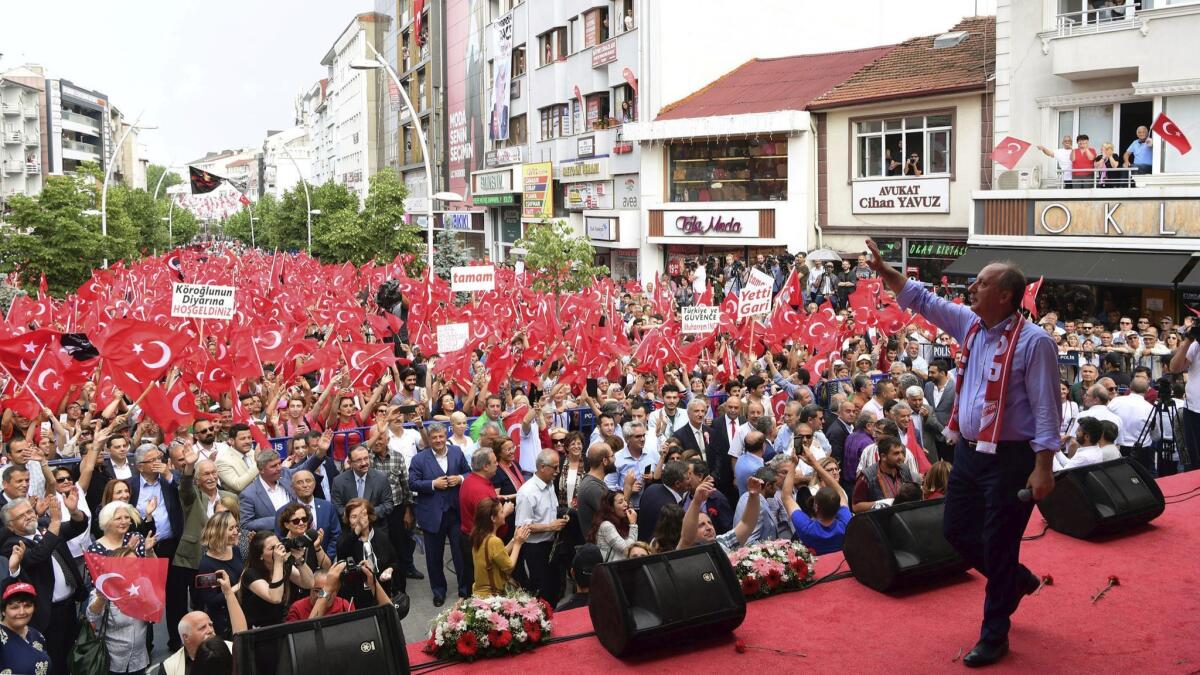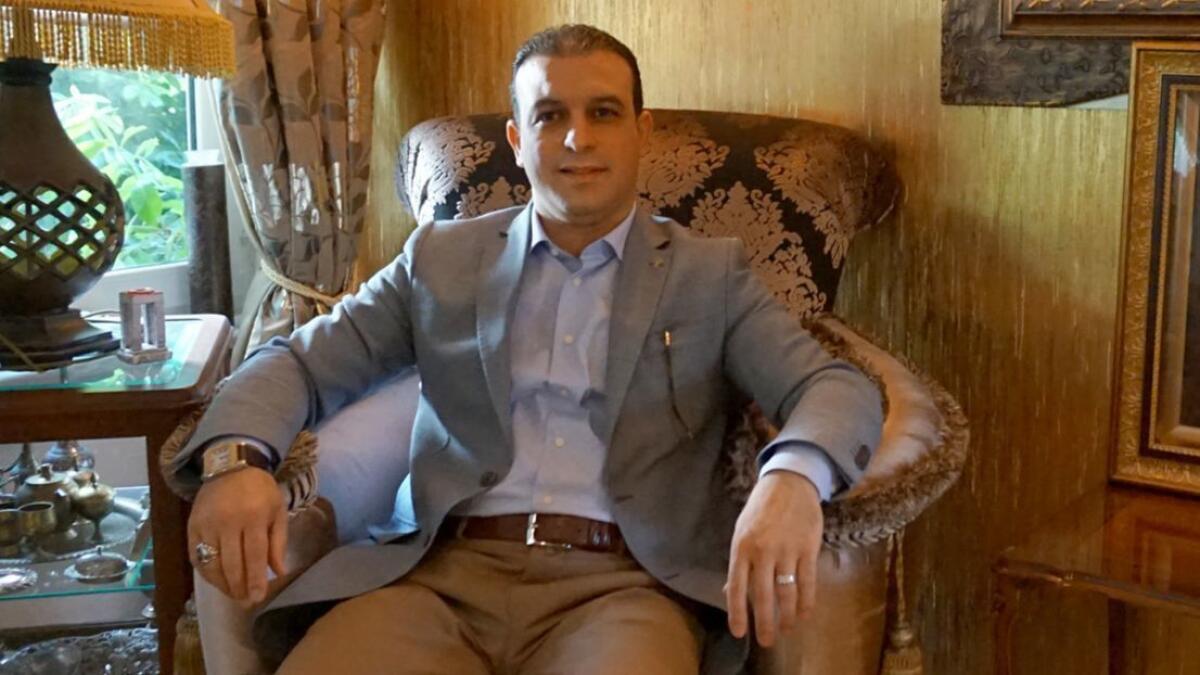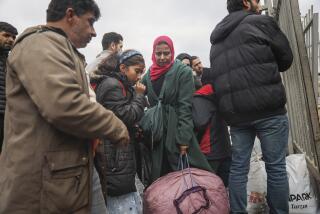Turkish President Erdogan faces pushback for pro-Syrian refugee stance ahead of June election

- Share via
Reporting from Bursa, Turkey — Two years ago, Muhammad Sheikhuni got a chance to meet Turkish President Recep Tayyip Erdogan, a man he had admired ever since he moved to the country from Hama, Syria, in 2008.
The encounter at a crowded public gathering for the president’s supporters in Bursa left Sheikhuni so moved that he changed his last name to Erdogan.
“I just spoke to him for a few moments, but I was impressed,” Muhammad Erdogan, a businessman who became a Turkish citizen in 2016 and is running for parliament, said recently at his home outside Bursa.
“I don’t have some personal love for Erdogan,” he said, “but I saw that he has been sincere in helping the Muslim world. What else can you do but love him?”
Many people in Turkey could answer that question without mentioning anything resembling love. The country has been under a state of emergency since July 2016, after a failed coup by a military faction, and more than 50,000 people have been jailed under charges of terrorism. Critics say the crackdown has gone beyond those connected to the coup attempt and include anyone opposed to Erdogan.
The president last month called for elections June 24 — a year-plus earlier than scheduled — in a move expected to enable him to consolidate powers. As a result, a coalition of secular and religious leaders who believe Erdogan has gone too far has united to try to defeat him on election day.
As the conditions and the campaigning have intensified, the country’s policy toward the 7-year-old Syrian civil war, and the refugees it has produced, has become a common talking point. Polls show the ruling Justice and Development Party, or AKP, could lose power for the first time in years in part because of its position on refugees.
Months after fighting began in Syria in 2011, Turkey announced an open-door policy toward refugees, eventually providing humanitarian aid to hundreds of thousands of people, many of them in camps. As the war has dragged on, the numbers and needs of refugees have increased, creating many challenges for Turkey, including long-term housing, healthcare, employment and education for Syrians.
A January report by the International Crisis Group said that although Turkey had “demonstrated remarkable resilience” in absorbing the refugees, growing hostility among locals was “ripe for politicization.” During 2017, at least 35 people died in Turkey, including 24 Syrians, in incidents of refugee-related social violence, according to the report.

Erdogan, who has led Turkey for 15 years — first as prime minister and then as president — has supported antigovernment rebels in Syria and often refers to the refugees as “Muslim brothers and sisters” living in the nation of about 80 million people. More than 3.5 million Syrian refugees live in Turkey, according to government statistics, including 311,000 children born in the country since 2011.
Many government supporters also say Syrians have helped the economy. Syrian investors account for more than 10% of all foreign-owned companies and more than $360 million in capital since 2013, according to the Union of Chambers and Commodity Exchanges of Turkey. Meanwhile, Turkey has spent $30.2 billion on Syrian refugees since 2011, according to government figures.
The Erdogan government instituted a program in 2016 that grants citizenship to some Syrians, regardless of how long they have lived in the country, who are highly educated or bring in foreign capital. Officials said about 55,000 Syrians have been granted citizenship so far — a geographically distributed constituency too small to make an impact in an election where nearly 50 million votes are expected to be cast.
Despite its likely small overall influence on election results, the program nevertheless is controversial among the political opposition because support for the Justice and Development Party is nearly universal among Syrians.
Omar Kadkoy, a research associate at the Ankara-based Economic Policy Research Foundation, said Erdogan’s overt support for refugees means that “those Syrians who become citizens of Turkey feel they have an ethical commitment to at least pay back with votes to the AKP.”
The Syria policy stands in contrast to opposition leaders who have said Turkey should not be involved in the Syrian war at all and have promised voters they will reestablish diplomatic ties with the Syrian government and find a political solution that sends the refugees home.
Kemal Kilicdaroglu, head of the Republican People’s Party, the country’s largest opposition party, told supporters at a campaign rally in Mersin this month that the day after the election, his party, if victorious, would seek a peace deal in Syria that would allow the refugees to return home.
“Syrians are human too, but go to your own country. Your mother, your father, your country, your flag, is there,” Kilicdaroglu said. “We will provide them all kinds of support to live a peaceful life in their own country.”
Some opposition leaders to the right of Kilicdaroglu have been even more emphatic about sending Syrians back to their homeland as soon as possible.
Meral Aksener, a presidential candidate for the newly established Iyi Party, which polls show could emerge as the most powerful opposition to the Justice and Development Party, told supporters at a campaign rally that “our living standard has dropped” because of the Syrian refugees.
Muhammad Erdogan is among those who disagree with Aksener. He said he studied interior design in Damascus and set up tourism and construction firms in Turkey that have brought investors to the country.
At his home last week, Muhammad Erdogan was busy fielding phone calls from Justice and Development Party leaders. He wore a ring with an Ottoman insignia and, as a devout Muslim, took breaks to pray and then returned to work.
He said the Syrian and Turkish people are historically intertwined. His wife is Turkish and his three small children speak four languages — Arabic, Turkish, English and German. His parents fled war-torn Syria in 2013 and joined him in Turkey.
The businessman said that at the height of the migrant crisis in 2014, he watched as Syrian friends launched boats from the Turkish coast not far from Bursa, hoping to make it to Europe.
“I told them they would regret it, that they should stay in Turkey because it has an Islamic culture, and there are economic opportunities here they won’t find in Europe,” he said. “Now they call me and tell me they wish they had never left.”
On May 21, the Justice and Development Party announced its nominees competing for the 600 seats in parliament, and among the candidates was the 34-year-old Muhammad Erdogan, who expects to win a seat despite what analysts may say about long odds.
“Turkey is a democracy, and there are people here from many different lands, so it’s not strange that a person originally from Syria could sit in parliament,” he said. “I will be a representative of the city of Bursa, and of course, I see myself as Turkish, but I won’t forget I am from Syria.”
Farooq is a special correspondent.
More to Read
Sign up for Essential California
The most important California stories and recommendations in your inbox every morning.
You may occasionally receive promotional content from the Los Angeles Times.










